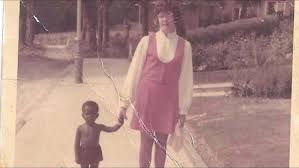Unveiling Britain's Hidden History: The Private 'Farming' of 70,000 Black Children to White Families
- owodunnimosopefolu
- Oct 5, 2023
- 2 min read

In the documentary "White Nanny Black Child," the practice of privately fostering tens of thousands of Nigerian children by white families in the UK since 1955, known as 'farming,' is explored.
Remi, among the many Nigerian children affected, shares her experience as being the only Black person in her family, street, and school due to this controversial practice.
These placements left a generation of children disconnected from their communities, struggling with their identities, and coping with lingering trauma.
Notable individuals like Seal, Kris Akabussi, Florence Olajide, Gina Yashere, Nelson Abbey, Adewale Akinnuoye-Agbaje, John Fashanu, and Justin Fashanu were privately fostered, enduring the long-lasting effects of this unofficial policy.
This phenomenon has been shrouded in secrecy and overlooked by Britain for too long, but now, Remi and others are sharing their stories in the documentary "White Nanny Black Child."

Remi's turbulent childhood involved frequent transitions between foster care and her biological parents, marked by fear, insecurity, and powerlessness. She vividly recalls disputes between her foster mother and biological parents over financial responsibilities, leaving her terrified of being separated from her mother.
Remi's journey included multiple foster families, each struggling to care for her, leading to persistent unhappiness. Her teenage years in Nigeria were equally miserable, prompting her return to her original foster family, further highlighting the disjointed nature of her upbringing.
Nine Nigerian-born individuals taken in by white families contribute their experiences to the documentary, revealing diverse stories of love, neglect, and abuse. Regardless of their treatment within the homes, they all share a sense of loss, confusion, and frequently faced racism, isolation, and discrimination in public.
Directed by Andy Mundy Castle, the film delves into how these adults have been affected, utilizing professional therapy to explore their pasts.
Postwar Britain was a challenging environment for Black children, marred by discriminatory signs, racial slurs, and infamous speeches like Enoch Powell's 'rivers of blood' address. Nigerian families, seeking work and education opportunities, encountered a cold, unwelcoming land.

Between 1955 and 1995, over 70,000 West African children were unofficially fostered by white British families while their parents pursued better prospects.
Desperate families would seek assistance through publications like Nursery World, sometimes with heartrending captions such as "Pretty baby girl needs a new home."
Now, six decades later, these once-adopted infants have grown up and are courageously sharing their stories.










Comments